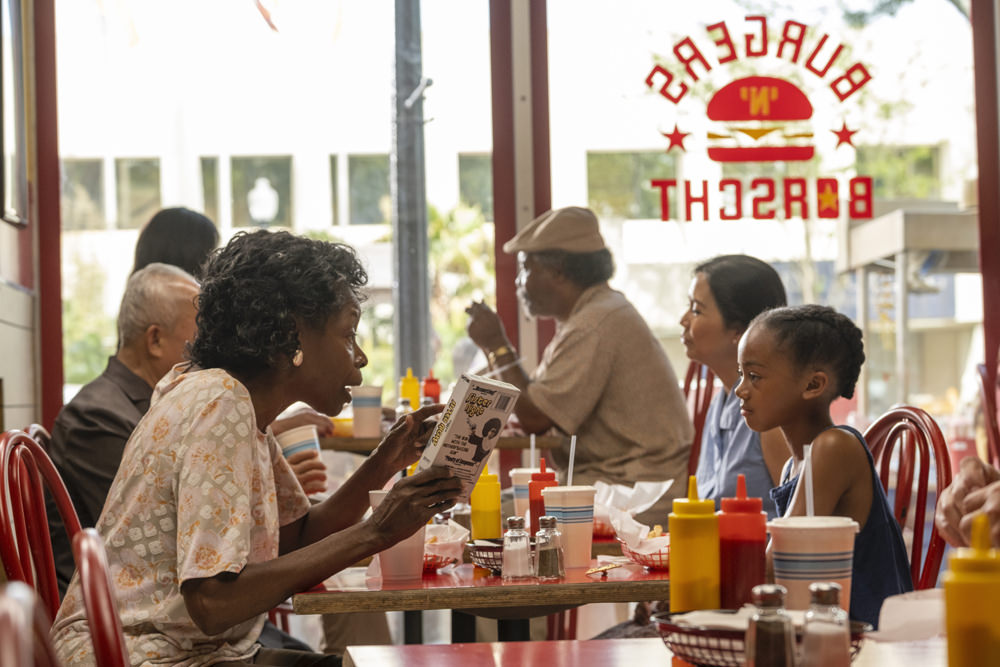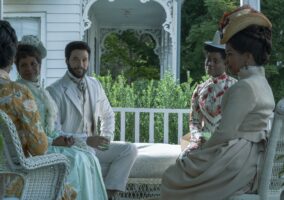
With this episode, Watchmen finally forced us to deal with the elephant in the room.
Okay, sorry. We felt almost legally obligated to make that pun, but in our defense, it was practically forced on us by show creator Damon Lindelof and episode writer Stacy Ossei-Kuffour. In almost any other instance, we’d consider a show putting an actual elephant inside a room as a form of plot twist to be almost criminally obvious and on-the-nose, but this episode was clearly designated in the minds of its creators as “The one where we get really obvious about everything.” For its first five episodes, Watchmen was a bit of a slow burn, centering the story on depictions of historical racism and the tropes of your average police procedural. But the chaotically blunt energy that characterized last episode’s pulp-noir exploration of Will Reeves’ memories fairly exploded with this episode. Suddenly, the show that opened with the most intensely haunting depiction of the Tulsa attack ever seen on film or television has super-science, trap doors, and megalomaniacs laughingly describing their master plan to damsels in distress. It’s kind of like when Lost said “screw it,” and threw the whole cast through a time portal after four seasons of being coy about what the show really was. Damon Lindelof may just have learned his lesson from that, because to our pleasant surprise, this show doesn’t stretch its mysteries out too long. In the first episode, characters talked about whether or not Dr. Manhattan could disguise himself as a human. In the seventh episode, the question was answered in explosive and shocking fashion. Reader, we screamed. And honestly, we’ve never done that in response to a TV show before. It wasn’t just the shock of Angela’s actions in that last thirty seconds and how it recasts everything we know about her, it was also how well the reveal of Cal’s true identity slots into what the show is trying to say and do.
By opening on a documentary on Jon Osterman’s life, the episode underlines Dr. Manhattan’s whiteness before making its most shocking reveal yet: that he has been disguised – seemingly without any of his original memories – as Angela’s wistful, detached, atheist (Boy, the clues really were there, weren’t they?) husband. This makes the second hero from the original graphic novel to be revealed as a black man. But while Will Reeves whitened his skin to fool the public into thinking he was a white man, Dr. Manhattan is a white man walking around in a black man’s skin. This is of a piece with all of the racial … confusion (for lack of a better word) surrounding the character of Angela, a black woman raised by Asian people in an Asian culture who married a white man (with blue skin) disguised as a black man and became mother to a trio of white children. Notice in the opening scene as little Angela walks through the streets of Saigon how racially homogeneous the scene is and how Angela and her family stand out more than the people walking around in blue body paint. For Angela, her blackness has been a glaring incongruity and an open question that she spent her life alternating between trying to ask or simply avoiding. Her childhood obsession with Sister Night is bound up entirely in the fact that she looks like the actress who plays her; a fact with heightened importance to someone growing up around people who don’t look like her.

This sense of racial confusion is dramatized by the lingering effects of Nostalgia on Angela’s system. We aren’t watching a flashback of Angela’s childhood, we’re seeing a relived memory brought forth by the drug’s withdrawal. We aren’t “in the moment” the way a flashback is normally depicted. We’re in Angela’s brain in the present day, watching as her intensely relived childhood memories constantly get interrupted by flashes of her grandfather’s life. This device allows for deeply, bizarrely poignant moments like Angela wearing her grandfather’s skin while she hugs her youthful grandmother in the 1940s layered over Angela as a child standing over her dead grandmother in the 1980s – the span of a life played out between the beats of a pop song. But this effect also allows the show to parallel the Tulsa attack with the death of her parents – it’s all violence perpetrated on her family line by people outside her race, from her perspective at that moment. But her great-grandparents died at the hands of racists determined to wipe them out while her parents died at the hands of terrorists who saw them as invaders. From descendants of slaves to symbols of colonialism, from trusting in the law to subverting it, Angela’s family history is replete with confusion, gray areas, and unanswered questions. Nothing in the show is entirely “clean” or simple. We tend to think that’s by design – not because racism is a complicated issue, but because this show isn’t going to make any part of this story easy on the audience. Angela is unquestionably the “hero” in this tale, but she’s also a cop who routinely assaults citizens and tortures suspects. Judd Crawford insisted he was a hero until his dying breath. Will Reeves is both a victim of intense violence and also a perpetrator of it. Lady Trieu is trying to save the fucking world but she also cloned her mother and is force-feeding the girl memories against her will. Even as the story rather clearly draws a line for the first time separating the good guys from the bad; those intent on saving humanity vs. those intent on conquering it (easily the oldest continuing trope in the simplistic and childlike superhero genre), it remains committed to keeping things as confusing and muddled as possible.
Why is Lady Trieu, a massively powerful and brilliant billionaire tech CEO mere hours away from the launch of her mysterious millennial clock acting like a nurse to Angela? Because Angela is the most important person in the world right now. She’s the grand-daughter of the world’s first superhero and the wife to the world’s most powerful superhero. She is holder to two of the most powerful secrets in the world – and those secrets, her family history and the identity of her husband, are where the various storylines all converge. White supremacists are intent on killing Superman and making a new one for themselves. The life’s work of Will Reeves, the super-science of Lady Trieu, and the existence of Dr. Manhattan are the only thing the world has to prevent the Ku Klux Klan from gaining omnipotent power. As superhero plots go, that one’s a barn-burner.
The one aspect of the story that still sits outside all of these events is Adrian Veidt’s storyline, which keeps getting more and more absurd with each episode. Wherever he is, he’s clearly not the master of that domain. Given the hints that his story is unfolding at a different pace from the main story, along with Lady Trieu’s clear modeling of her own life and work after his (along with a knowing retort to Angela that her “father” will be present for her greatest triumph) and the rapid purchase of the Clark family’s farm just so she could lay claim to whatever crash-landed on it from outer space, we propose that Adrian isn’t just rapidly colliding with the main story, but that he did so quite some time back, in perfect Adrian (“I did it 35 minutes ago“) fashion. But don’t hold us to that one. We’re not at all confident that we can predict where this show is going next – and that’s just fine by us.

One more thing to which attention must be paid: When the episode jumped from Jean Smart and Frances Fisher circling each other before one of them makes her power move (And who didn’t see that coming? As Tom said to Lorenzo, “Come on. When did Frances Fisher ever play a totally neutral character?”) to Angela and Lady Trieu circling each other and making a series of power moves, it really struck us how well and how consistently Watchmen is attempting to upend the traditional superhero tale and populate it with characters and interactions often left outside the genre. Maybe we should be in a place where such things aren’t notable, but until that day comes, it’s necessary to point out – and praise – how often the show depicts scenes of female characters speaking to female characters, across a range of ages and races, about matters of importance. Angela and her grandmother, Angela and Lady Trieu, Angela and the Vietnamese cop (Jennifer Vo Le, imbuing a small but important one-off role with charisma and heart), Angela and Bian, Laurie Blake and Jane Crawford. Watchmen is taking the superhero story most famous for deconstructing the superhero genre and rather pointedly deconstructing it further, exposing how both the genre as well as the original Watchmen graphic novel, centered the perspectives of white male characters to an extent that begs for questioning. We already know that superhero comics can be seen as reductive male power fantasies. What Watchmen the TV series is saying is that superhero comics are also rooted in white power fantasies with misogynistic undertones and it’s long past time these things were hauled out into the open and addressed. The fact that the creators managed to build a hell of a story around something that could have come across like a polemic is to their enormous credit.
[Photo Credit: Mark Hill/HBO]
Caitriona Balfe in The Vampire’s Wife at the British Independent Film Awards Next Post:
“Star Wars: The Rise of Skywalker” star John Boyega in Raf Simons at “Good Morning America”
Please review our Community Guidelines before posting a comment. Thank you!



